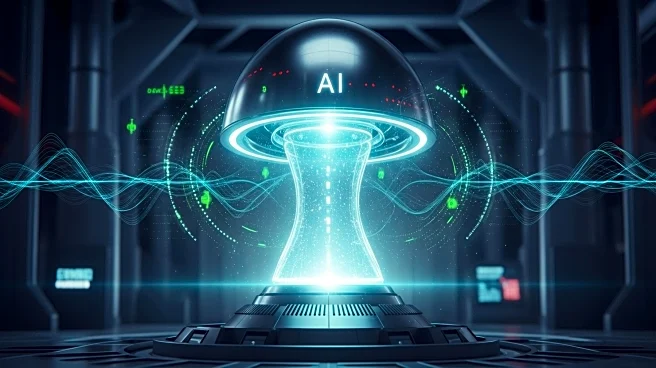What is the story about?
What's Happening?
Vistra Energy is positioning itself as a key player in the AI-driven energy transition, with a significant focus on nuclear power. The company has seen a 48.5% stock price surge in 2025, driven by its diversified energy portfolio that includes nuclear, natural gas, and renewables. Vistra's strategic investments, such as the acquisition of Energy Harbor's nuclear sites, have expanded its generation capacity to 38 gigawatts, making it the second-largest competitive nuclear fleet in the U.S. This aligns with the Biden administration's goal to quadruple U.S. nuclear capacity by 2050. Vistra has secured long-term power purchase agreements with tech giants like Amazon and Microsoft, ensuring stable revenue streams for its nuclear assets.
Why It's Important?
Vistra's focus on nuclear energy is crucial as AI data centers demand reliable, emissions-free baseload power. The company's integrated generation-retail model allows it to navigate market volatility better than pure-play energy producers. However, critics argue that nuclear power is capital-intensive and fraught with risks, including long development timelines and cost overruns. While AI-driven energy demand is growing, it still accounts for a modest share of total electricity usage. Renewable energy alternatives are gaining traction as more cost-effective solutions, posing a challenge to Vistra's nuclear-centric strategy.
What's Next?
Vistra plans to invest $2.5 billion by 2027 in nuclear and storage projects, aiming to capitalize on the AI energy boom. The company has also acquired seven natural gas plants, adding 2,600 MW of capacity in AI growth hubs like PJM and California. Despite these moves, Vistra's exposure to nuclear energy remains a double-edged sword, tying it to regulatory uncertainties and public sentiment shifts. AI technology may help optimize nuclear operations, potentially reducing costs, but the long-term viability of nuclear assets remains uncertain.
Beyond the Headlines
Vistra's strategic flexibility through its diversified portfolio offers a buffer against the risks associated with nuclear energy. The company's share buyback plan signals confidence in its capital allocation strategy. However, the structural challenges of the nuclear sector, coupled with the rapid pace of renewable technologies and grid innovations, may impact Vistra's long-term growth trajectory.

















